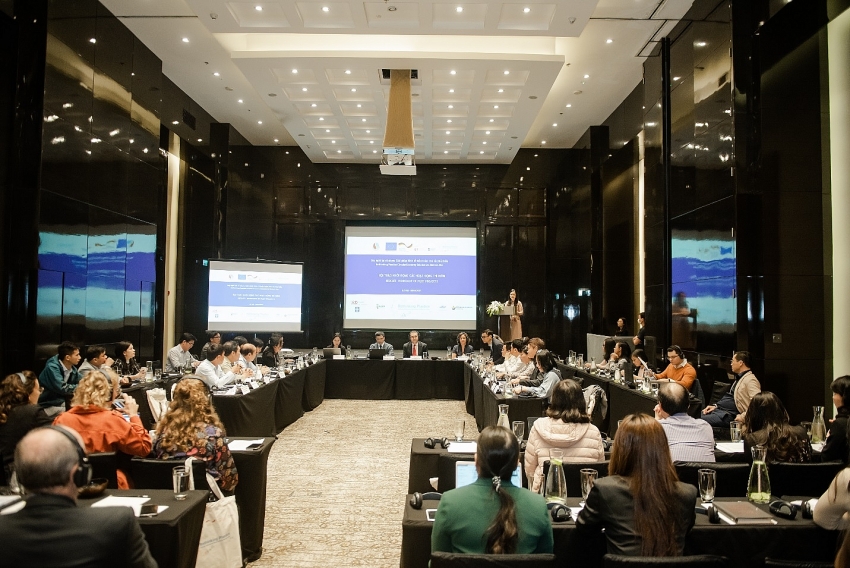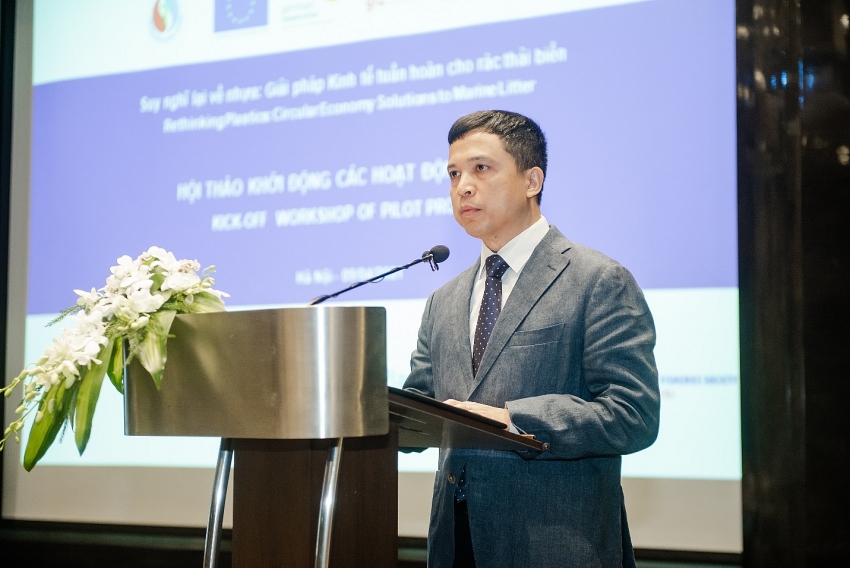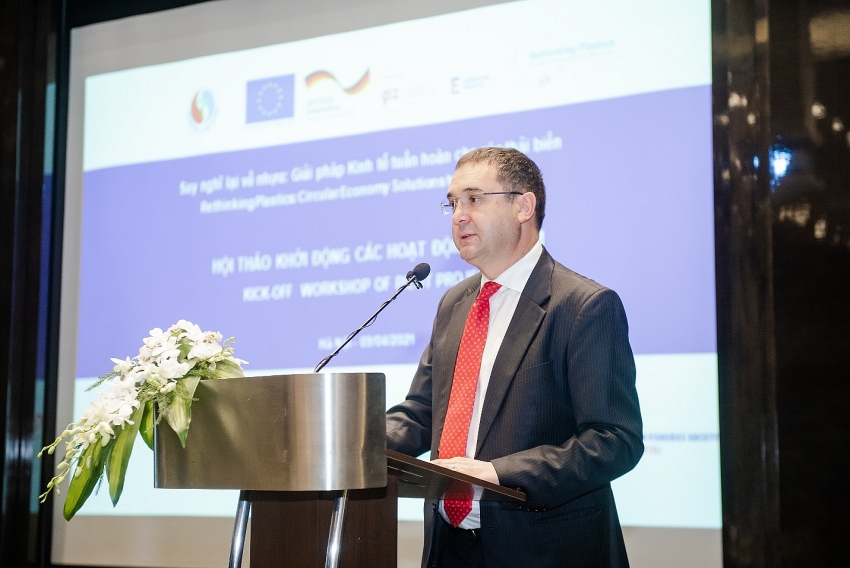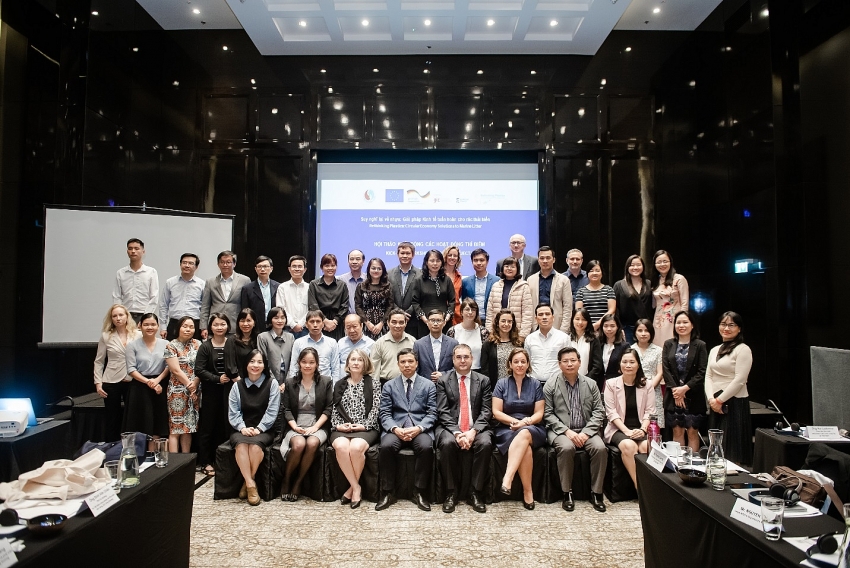Rethinking Plastics kick-off workshop of pilot activities
 |
| Rethinking Plastics kick-off workshop of pilot activities |
The workshop for the Rethinking Plastics Project held in Hanoi was co-organised by the Ministry of Natural Resources and Environment (MoNRE), the Delegation of the European Union (EU) to Vietnam, and Expertise France. Key local and international stakeholders participating in the event to discussed initial results and the implementation of four pilot projects that are being rolled out in Hanoi, Ho Chi Minh City, and Phu Yen province.
The four pilot projects aim to test policy approaches and practical initiatives to reduce plastic waste and marine litter in Vietnam. They will focus on policies such as the promotion of circular economy principles and responsible practices in waste management, including extended producer responsibility (EPR) schemes, reduction of single-use plastic bags in supermarkets; “fishing-for-litter” schemes and ship waste management procedures at commercial ports.
In his opening speech, Pham Phu Binh, director general of the International Cooperation Department of the MoNRE said that plastic pollution has been a rising issue since the 1970s, with now plastics floating in the ocean covering nearly five times the area of Vietnam.
 |
| Pham Phu Binh, director deneral of the International Cooperation Department of the MoNRE |
“The Vietnamese government and the MoNRE have been rolling out both short- and long-term solutions to reduce plastic pollution and promote development through circular economy approaches,” he said, noting that the government has issued Resolution No.26/NQ-CP in March 2020 to implement its 2018 Resolution No.36-NQ/TW on sustainable marine economy, and then in December issued a National Action Plan on marine plastic debris management.
Binh said that the circular economy model plays an important role in these government initiatives and that the Rethinking Plastics Project, as well as the experiences and lessons from the implementation of the pilot projects, could inform policy development in Vietnam. He added that the success of the four pilot activities could help in replicating them on a larger scale across the country.
In his remarks, Rui Ludovino, first counsellor, Climate Action, Environment, Employment, and Social Policies at the Delegation of the EU to Vietnam, warned that if marine litter is not reined in, there would be more plastics than fish in the sea by 2050. He highlighted that Southeast Asia is a hotspot for marine litter due to inefficient economic arrangements, lack of initiatives to reintroduce plastics into the economy, and poor waste management practices by all stakeholders.
 | |
| Rui Ludovino, first counsellor, Climate Action, Environment, Employment, and Social Policies at the Delegation of the EU to Vietnam
|
He highlighted the advances the EU had made in the implementation of its circular and low-carbon future. He cited the 54 actions of the 2015 Circular Economy Action Plan, now all fully implemented or under way, and the 2018 European Strategy for Plastics in a Circular Economy, which sets as a target that by 2030 all plastic packaging placed on the EU market will either be reusable and recyclable. Additionally, a new Circular Economy Action Plan had been introduced in March 2020, outlining new mandatory requirements for recycled content, with special attention on microplastics, as well as biobased and biodegradable plastics.
While making strong headways at home, he added, a key priority for the EU was to spur change across the world. As no single actor can solve a global issue of a magnitude like plastic pollution, taking international cooperation was essential.
“The four new pilot activities complement these joint efforts towards a circular economy with concrete actions and experiences from the local level, involving the communities and households, local businesses, and administrations,” Rui Ludovino added. “We hope that they can serve as best practices and inspire future initiatives and policy development.”
“Just the fact that we have managed to gather all of you here – policy-makers, corporations, the scientific community, and the media – is already a success,” Rui Ludovino added, expressing high hopes for strong stakeholder participation and tangible results at the end of the Rethinking Plastics Project in 2022.
 |
Rethinking Plastics
The Rethinking Plastics Project aims to contribute to efforts on reducing marine litter and the proliferation of plastics through cooperation with key stakeholders in enhancing policy dialogues, managing plastic waste, and promoting sustainable and responsible consumption and production practices. It is implemented across seven countries including China, Indonesia, Japan, the Philippines, Singapore, Thailand, and Vietnam with a total budget of €10 million ($11.9 million).
It is co-founded by the European Union and the German Federal Ministry for Economic Cooperation and Development (BMZ) and implemented by the Deutsche Gesellschaft fur Internationale Zusammenarbeit (GIZ) and Expertise France.
The initiative has been running since May 2019 and will end in April 2022 with the aim of supporting the transition towards sustainable consumption and production of plastic in East and Southeast Asia and contribute to a significant reduction of marine litter.
So far, in addition to the recently-launched four pilot projects in Vietnam, 16 others in four other countries (China, Indonesia, the Philippines, and Thailand) have been approved to be implemented within the Rethinking Plastics Project.
Pilot projects in Vietnam
In Vietnam, the implementing bodies of the Rethinking Plastics Project are cooperating with the MoNRE, the Ministry of Agriculture and Rural Development (MARD), and the Ministry of Industry and Trade (MoIT), the Ministry of Transport (MoT), as well as local authorities. The ultimate aim of the pilot projects is to effectively reduce plastics pollution and marine litter by promoting circular economy approaches and sustainable use and production while identifying successful practices for replication on a larger scale.
Following initial assessment phases, each pilot project will work closely with local partners in crafting new, practical solutions, guidelines and concrete recommendations to support them in the development of tailored sectoral public policies.
|
What the stars mean:
★ Poor ★ ★ Promising ★★★ Good ★★★★ Very good ★★★★★ Exceptional
Related Contents
Latest News
More News
- Keppel Land raise plastic waste awareness (July 09, 2022 | 13:45)
- 3Vs for gender-inclusive circular era (July 01, 2022 | 14:33)
- Alliances formed in mission to alter behaviours (July 01, 2022 | 14:19)
- Plastic use drop hinges on consumers (July 01, 2022 | 14:03)
- Mainstreaming circular plastic plans (July 01, 2022 | 13:18)
- Applying popular new methods to combat single-use plastic habit (July 01, 2022 | 10:00)
- Retailers endeavor to promote sustainable consumption patterns (June 24, 2022 | 14:46)
- BAEMIN extends green journey in Vietnam (June 23, 2022 | 14:51)
- Closing event of Rethinking Plastics heralds new age of combatting plastic pollution (June 23, 2022 | 11:53)
- Talkshow Innovative Solutions & Substitutes for Single-use Plastic towards Green Consumption (June 22, 2022 | 20:46)

 Tag:
Tag:


























 Mobile Version
Mobile Version